The best new albums this week
The albums that you cannot afford to miss
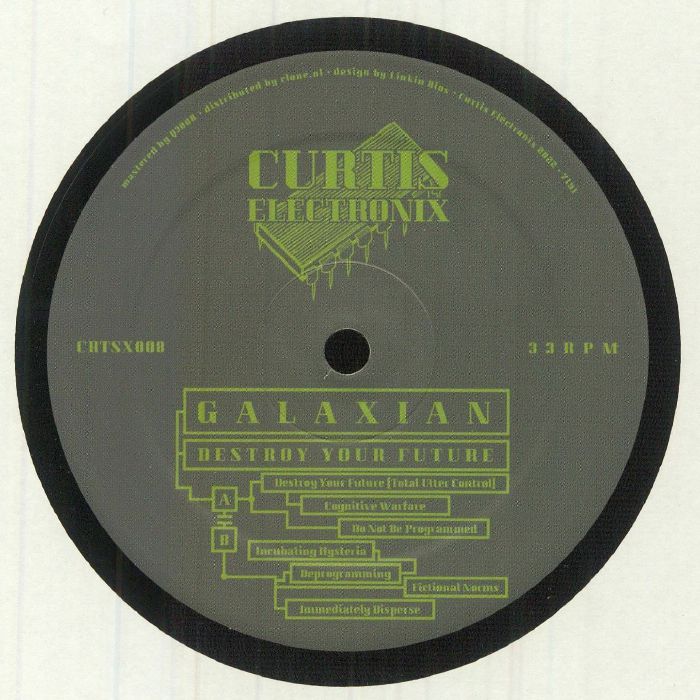
ALBUM OF THE WEEK
Galaxian – Destroy Your Future (Curtis Electronix)
Electro has always been concerned with where humanity is headed. Since the first wave of body-poppin’ freestyle and rap in New York the sound has questioned our relationship with technology, as the MCs voice got pulled through a vocoder and the message looked space-wards. From Jonzun Crew, Logic System and Warp 9 through to Cybotron and across the myriad threads of Drexciya-related projects, science fiction is the thematic bread and butter of electro, and the outlook isn’t always chipper. Like the foreboding Skynet mythology of the Terminator franchise, electro has often sounded dystopian as it frames a vision of tomorrow. Listen to the ice-cold outlook on ‘Sterilization’ by Dopplereffekt or Anthony Rother’s ‘Sex With The Machines’. It’s not exactly a rose-tinted projection.
Beyond themes, the sound of electro has frequently evolved in darker creative directions, especially when artists have sought to push the genre forwards rather than mining an established sound. DJ Stingray is perhaps one of the greatest examples of a restless experimenter, and by now his fast-paced, angular take on the genre has pushed into wild, alien territory where the very notion of electro hangs on by a thread. But crucially, it is still machine funk you can track back through those decades of development. At a time when derivative electro is still being mercilessly churned out, Galaxian is one of the few other innovators presenting something frankly mind-blowing that still retains that fundamental essence.
It’s actually been a couple of years since we last heard from the Glaswegian renegade otherwise known as Mark Kastner. With his faceless combat get up and titles like Paradise Engineering and NU-1000 (a split release with Stingray, no less), Galaxian ticks all the boxes for an electro artist committed to the more fantastic elements of the tradition. Remember this is a genre which tracks back to Parliament’s own psychedelic P funk mythology in all its theatrical splendour. These aesthetic decisions by Kastner don’t appear to be a coincidence. As if to round things out, this new album of his comes on Italian label Curtis Electronix, lovingly named after the inventor of the CEM chips integral to so many iconic synthesisers.
Destroy Your Future sets out its stall before you’ve even hit play. We’re gazing into the crystal sequencer here, and the prospects don’t look promising. The start of the album confirms the trajectory, with a comically pitched-down voice talking of dystopia and “total, utter control” over a nervy cascade of rapid-fire percussion. It’s a curiously suspended track which holds back on obvious rhythmic devices. The expected thump of 808 bass, for example, never kicks in, but rather odd daubs of sub stumble in much later, backed up by errant splashes of synth. It’s an assertive statement of intent, demonstrating that danceability is not the primary concern here.
Take ‘INCUBATING HYSTERIA’ as well, which features a slightly more discernible groove as spat out by a steady midrange snare. That one tick stubbornly holds on despite the molten mess of sonics splashing around it – a veritable bath of pinging delay tails and wobbly LFOs set to stun. The same sonic effect follows through on ‘DEPROGRAMMING’, lending itself to this disorienting atmosphere where the very walls of the track seem to be shaking. It doesn’t help that the synth sounds themselves come in malleable, rubbery forms which seem to be manhandled before your very ears, sequenced with a loose flair which tests your perception of the groove. It’s wilfully unsettling, and utterly remarkable.
There are some more linear moments which hammer home the electro dimension of Galaxian, though. ‘COGNITIVE WARFARE’ has a solid kick and snare arrangement, albeit pitched into battle with bloated daubs of distorted bass. ‘DO NOT BE PROGRAMMED’, which surely nods to Underground Resistance, has a fat 808 kick riding underneath. Ultimately though, the minimal framework in these more focused tracks still serves as a vessel for endless reams of mutant sound design.
In a similar style to the nihilistic sound of Bunker Records, Galaxian’s whole purpose on Destroy Your Future revolves around this bleak, hopeless vision. Where the Hague posse leant in on lo-fi noise as an unavoidable part of the process, he instead wields the dirtier aspects of his sound with an exacting poise. The end result is even more unnerving because it sounds so visceral in your ear. This is one of those records that shocks you with its originality and the clarity of intent from the very start. If you were to listen to the melodious elegance of Mark Kastner’s other work as Kas, you could appreciate how purposeful this expression is, which makes it all the more impressive. It’s not what you would call easy listening, but it is unquestionably brilliant.
OW

Shelley Parker – Wisteria (Hypercolour Limited)
If we think of rave as an inherently experimental genre, which it surely started out as, Shelley Parker’s new album is digging back into that energy to split the difference between cerebral sound art and infectious, physical club gear. Parker’s work to date is a little tricky to pin down. Most reading this would have likely picked up on her 12” for Hessle Audio, 2018’s Red Cotton, but she’s worked as a composer, performer and producer for over 20 years. Other releases have popped up on Entr’acte and OOH-Sounds, and she has a small label of her own called Structure, but she doesn’t seem to follow typical artistic trajectories as defined by the music industry.
As such, she sounds positively free on Wisteria, working according to her own internal logic. There is a sense of the past for sure – of time-stretched sampling, effects processing and resampling, noisy artifacts – but Parker’s approach to the broad church of hardcore is with an avant garde sensibility, which those processes were when they were first embarked on by producers in the late 80s and early 90s. And so, you get to enjoy non-linear arrangements and psychoactive sound design as an experimental trait, not a basic part of the rave formula.
Parker’s own signature style within this field feels as indebted to post-industrial music as rave, with steely textures and a pervading gloom defining the countenance of the album. In fact, there’s a clue in the title. Wisteria is a sprawling, tangled and inquisitive plant – some might say it’s a little aggressive. Musically, Parker has echoed the tangled pathways along which hardcore, techno and other rave genres have mutated since their genesis, picking up qualities from industrial, noise and dub through their myriad evolutions. The dynamics of imposing, soundsystem-oriented music abide, but the quaking sub-bass, rasping drums and repetitive passages are ornamented and disrupted with dense atmospherics and abrasive tones. It’s an album which celebrates and contextualises the heritage of rave while offering a different way to experience it, bound up in eight imposing compositions.
OW

Jimmy Smack – Death Is Certain (Knekelhuis)
It seems as though the wells of post-punk mythology will never run dry, no matter how many reissues come our way. Dutch label Knekelhuis doesn’t devote so much time to older material, but given their discerning taste and penchant for the unusual it’s an instant matter of interest when they do dust something down. In this case, it’s the strange and wonderful tale of Jimmy Smack, a performer from early 80s LA unlike any other.
As a trained dancer and theatre performer, Smack’s work centered around live shows and a few private press releases between ’82 and ’83. His ghoulish skeleton make up was no foil – everything about his art was death-related. On this compilation, you learn everything you need to about this misfit amongst misfits, who recited his apocalyptic poetry with a throaty, devilish snarl over brittle Dr Rhythm beats and the incessant, funereal wail of his electric bagpipes. In the end, the result is totally punk, and the subject matter feels grimly relevant four decades later.
On ‘Souls’, Smack snarls over a machine gun ratta-tat-tat; “The bombing has begun, from where I cannot say. Who was the first to fire? Does it matter anyway? It’s burning in the cities, there’s no place left to hide. A rain of radiation, from a psychedelic sky. LA’s in the ocean, Moscow’s in a hole, and everybody’s praying, for their immortal souls.”
If you’re looking for a soundtrack to oblivion, let Jimmy Smack be your guide.
OW
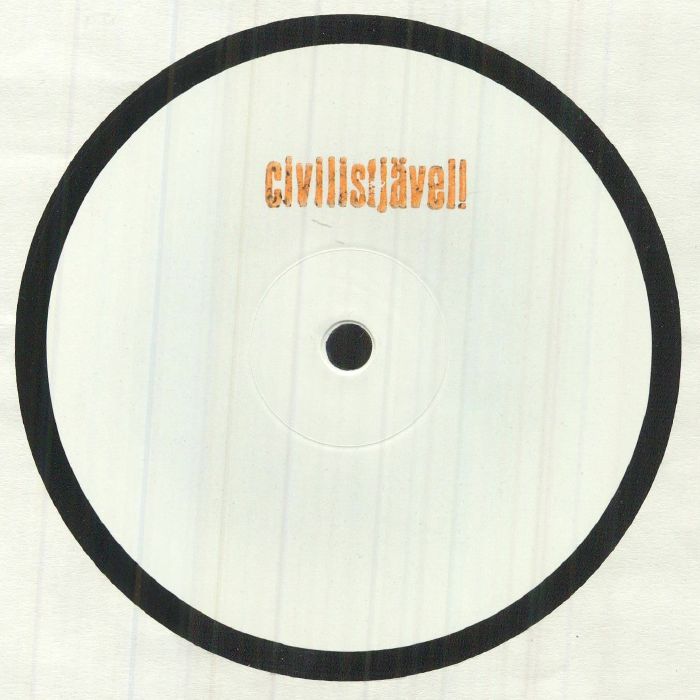
Civilistjävel! – 4-5 (unknown label)
Vaguely mysterious Swedish outfit Civilistjavel! could easily remain elusive for some time yet through the simple fact of emerging through the befuddling fog of Low Company. Quite why the erstwhile store and low key distro operation is so confounding is hard to say, but anonymous projects such as these lend themselves to a ‘scene’ apart from regular ‘scenes’, where there manages to still be a little myth and magic around the decreasingly clandestine act of making tunes.
This particular artist is about to break just a little more cover with an album on their own label, but before that happens, now is a great time to snatch one of these limited but frankly incredible albums. One suspects this will be the last chance saloon given the aforementioned commitment to mystery associated with Low Company and its satellite operatives.
Civilistjavel!’s sound is something like dub techno and industrial taking a walk together, although the techno part tends to be a smudged afterthought rather than a consistent presence. The Swedish element certainly figures in these frosty, subtly overdriven soundscapes, coming on like a Northern Electronics release with the modernist techno boom elegantly scooped out. If you like your rhythmic electronics a safe distance away from the dancefloor and loaded with grainy, textural melancholia, you’re not going to want to miss out on grabbing this one.
OW
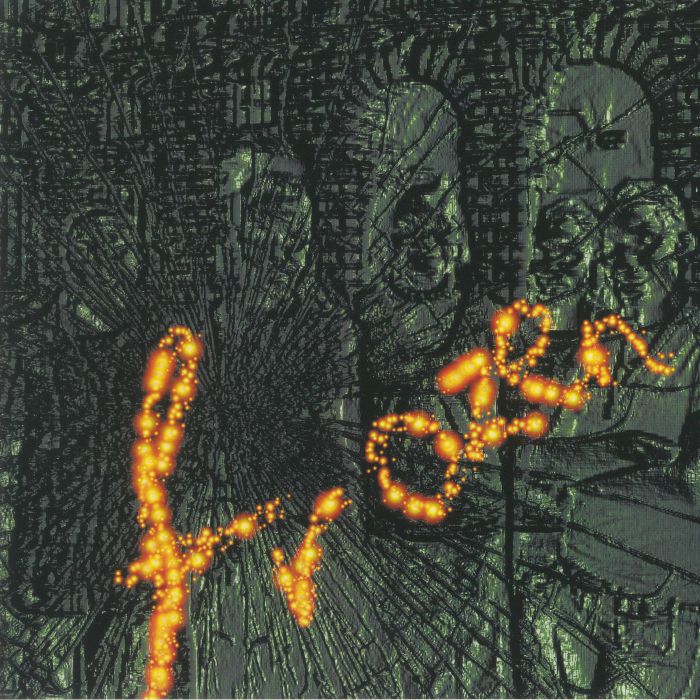
Klein – Frozen (Parkwuud Entertainment)
‘Frozen’ was Klein’s breakthrough hit album, following up fresh-faced bubbler projects like ‘Only’ and ‘Tommy’, not to mention the underground dance banger that was ‘Bondage 007’. Fresh off the back of her recent Barbican showcase comes this new cassette reissue, which, in our estimation, shows off the artist as at her most unrestrained, experimental, and edgy.
Despite the name ‘Frozen’, it’s probably the furthest thing conceptually and values-wise from the unlikely Disney animated hit kids’ film. Instead, the project seems to deal with a sense of being completely and mentally locked in musical and urban psychosis. It’s as implied by the album cover: the hurt memory of something pure – young friendship – having had its outer layer of reality, a film of glass, shattered violently. The first track, ‘When Jesus Says Yes, Nobody Can Say No’, drops us immediately into city hell; fractured hip-hop beats, overdriven vocal drawls and painfully buried bangs sift in and out, like cubist ambulances whizzing past and nipping under curbs, impossibly.
Optimistic mental health affirmations go on to ironically adorn the track titles: ‘Care About Us’ ends on a maddening k-hole of twinging synths, followed by a group of men touting the track as an “absolute smash hit”. Meanwhile, ‘Needed And Saved’ is an ambient cut, completely waterlogged and drained by sonic backwash. It hardly sounds like we’re needed and saved, or like we’ve got this, but whatever is going on here, we’re 100% here for it.
JIJ
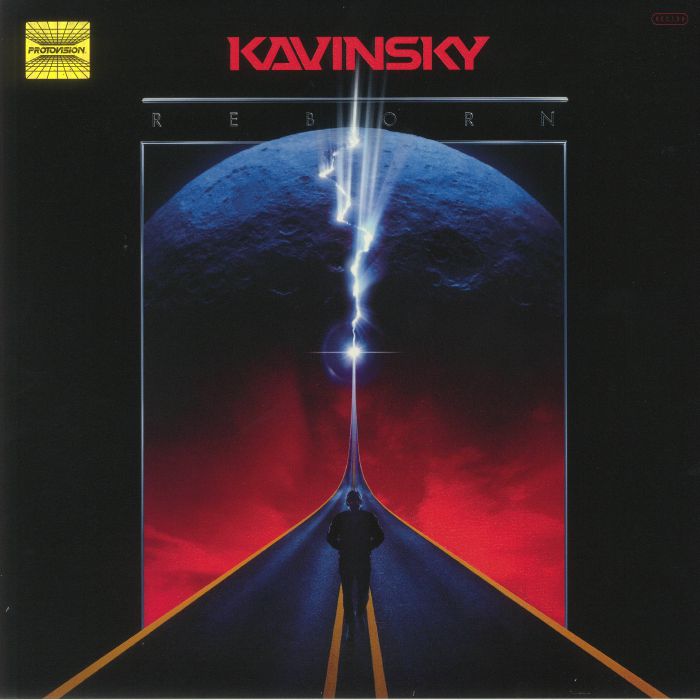
Kavinsky – Reborn (Fiction / Virgin Music France)
This is something of a treat for those who know their coldwave. Kavinsky is the enigmatic composer whose totemic ‘Nightcall’ set the soundtrack for Nicolas Winding Refn’s ‘Drive’ alight. Illusive to the point of wondering if he actually existed, it turns out Kavinsky is very much real.
The conceit is that French musician Vincent Belorgey crashed his Ferarri in 1986 and came back as a zombie, Kavinsky, to make coldwave classics. The truth is as implausible. Ingrained in the upper echelons of French dance music, Belorgey is pals with Daft Punk – indeed, ‘Nightcall’ was co-produced by Guy-Manuel de Homem-Christo and Kavinsky opened for them on their 2007 ‘Alive’ world tour. His close associates also include Mr Oizo, Sebastian Tellier, Justice and Ed Banger production powerhouse, SebastiAn.
A well-connected chap that’s for sure. And one who likes to take his sweet time over releasing music. With ‘Drive’ (released in 2011) disappearing in his rear-view mirror, it took a mere two years to cash-in with a debut album, ‘Outrun’, and ‘Reborn’ is his first music since. What’s more, it’s a bit of a detour. Where ‘Outrun’ was all sleek ‘Night Rider’ synth workouts, ‘Reborn’ finds Belorgey, well, reborn, working with several vocalists who purr over his hallmark electronic thrummers.
From the shuddery synth runs and warm bass pulse of opener ‘Pulsar’, it’s clear he knows how to bring the killer intros. Every track has you prickling with anticipation in under four bars. As it hits its stride, ‘Vigilante’ will have Hall & Oates wondering if they wrote it, while ‘Zombie’ is the best track not to feature on ‘The Breakfast Club’. The highlight here though is a response to ‘Nightcall’ in the shape of the cinematic ‘Zenith’. Where the male vocal took the verses in ‘Nightcall’, here Morgan Phalen (Diamond Nights/Justice) steps in to take the chorus, while Franco-Finnish singer Olivia Merilahti from French indie outfit The Dø adopts her solo Prudence guise and velvets her way through the verses. Johnny Jewel will be waving at her from Italians Do It Better HQ some time soon. And the sax outro, oh the sax outro.
A coldwave master at work.
NM
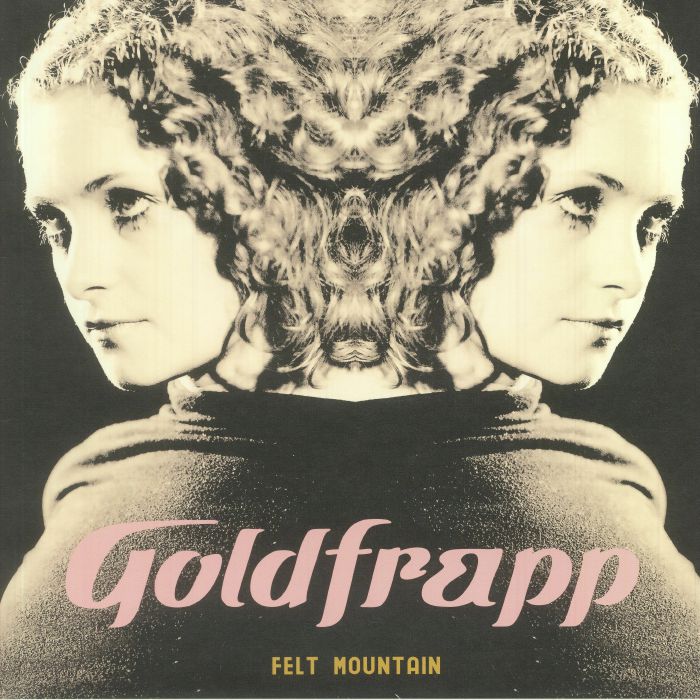
Goldfrapp – Felt Mountain (2022 edition) (Mute / BMG)
In the 22 years since it was first released, ‘Felt Mountain’ has weathered not one jot. In fact, it’s more contemporary-sounding now than ever, which puts Alison Goldfrapp and Will Gregory way ahead of their time.
When their Mercury-nominated debut long-player showed up in 2000, it was lazily tagged trip hop – a label no one wanted – but ‘Felt Mountain’ was nothing of the kind. It’s a shimmery spectre of a record drawing on a rich seam of lost 60s TV theme tunes, sideways pop and parallel-universe Bond themes.
Goldfrapp’s voice is to the fore and it really wows, shifting from barely there on the tip-toeing ‘Deer Stop’ to crashing over you like waves on ‘Human’, where Shirley Bassey dramatics enter proceedings. And let’s not forget, the track’s spooky strings were sampled by none other than Kanye West for ‘Freestyle 4’. ‘Lovely Head’ aside, because that’s in a league of its own, the standout is the glorious ‘Pilots’ with its theremin star turn. In the wrong hands that’s an instrument that can kill at 20 paces. In the right hands, my word.
Of course, Goldfrapp went on to blow the trip hop mutterers to pieces with the glam/electropop electronics of ‘Black Cherry’ and then they did it again, and again, with each subsequent album not so much moving the goalposts as setting them on fire to see what rises from the ashes. We very much welcome another trip round the block for this stone-cold classic.
NM

Camp Cope – Running With The Hurricane (Run For Cover)
Melbourne based indie-pop trio, Camp Cope, have made a name for themselves based upon their penchant for earworm hooks, tightly woven rhythms and frontwoman Georgia Maq’s cynical sincerity.
2018’s sophomore triumph, ‘How To Socialise & Make Friends’, offered scathing, unfiltered insight into the trials and tribulations of a young woman trying to make sense of a world perpetually refusing to listen or atone.
In the four years since, Maq dropped her melancholic solo debut, as well as collaborating with emo-trap labelmate Wicca Phase Springs Eternal on his ‘Stress’ single.
On their third full-length, enthusiastically titled, ‘Running With The Hurricane’, the band have opted to combine their core dynamics with the lessons they’ve accrued through their increased exposure, and the sheer ambition that has bolstered their material thus far, in order to craft a shoulder dislocating swing for the fences.
If the title wasn’t enough of a declaration of perseverance, the tracks hiding behind the curtain offer some of the most positive, affirmative musings from Maq and co, to date.
From the muted, country twang of the title-track to the lush, summertime sad-pop found on ‘Blue’, there’s no ignoring both the lyrical and compositional turn towards more introspective song craft.
The credited additional instrumentation from Courtney Barnett is evident throughout, with flourishes of acoustic ditty cum balladry offsetting the usually prevalent jagged jangle of the group’s earlier work.
Whilst still rooted somewhat in the emo spectrum of their label, Run For Cover, cuts like the witty, earnest, self-deprecating, ‘Jealous’, showcase a newly struck balance between Maq’s uncomfortable level of honesty and the trio’s desire to push themselves to becoming the biggest, brightest and best band they can possibly be.
In a recent New York Times interview, they admitted they’re happy and willing to get big, provided their fans still “cry and lose their minds” in the same manner. Spend some time ‘Running With The Hurricane’, and you’ll understand that there’s zero worry on that front.
ZB

Max Cooper – Unspoken Words (Mesh)
London’s Max Cooper isn’t your run-of-the-mill artist. In his world, a PHD in Computational Biology goes hand-in-hand with licks as a techno DJ and while the music is clearly front and centre the science is never far away.
His own Mesh label is something of a Venn diagram where music, art and science meet, dragging with them a wide range of creative collaborations. Is it maths? Film? Art? Psychology? Or perhaps a cookbook? It’s dizzying stuff.
‘Words Unspoken’ explores the weighty subject of the difficulties of communicating with words as part of a wider project he calls ‘Unspoken Words’. The album, which quivers with sophisticated left-field dancefloor thrillers is also released on Blu-ray DVD featuring short films commissioned by Cooper to accompany the tracks.
The centrepiece is the video for the riotous ‘Exotic Contents’, created with Cooper by Xander Steenbrugge, an artist and machine learning expert, who uses AI to turn Wittgenstein’s philosophical thoughts on the difficulties of using words to explain ourselves into a visual representation. Oh, and layer upon layer, it all comes mixed in ear-blowing Dolby Atmos. The mammoth swells of ‘Ascent’ will stop you in your tracks in a Jon Hopkins kind of way, while the does-what-it-says-on-the-tin ‘Symphony In Acid’ is wrecking-ball satisfying.
Not so much an album as an entire audio-visual feast.
NM
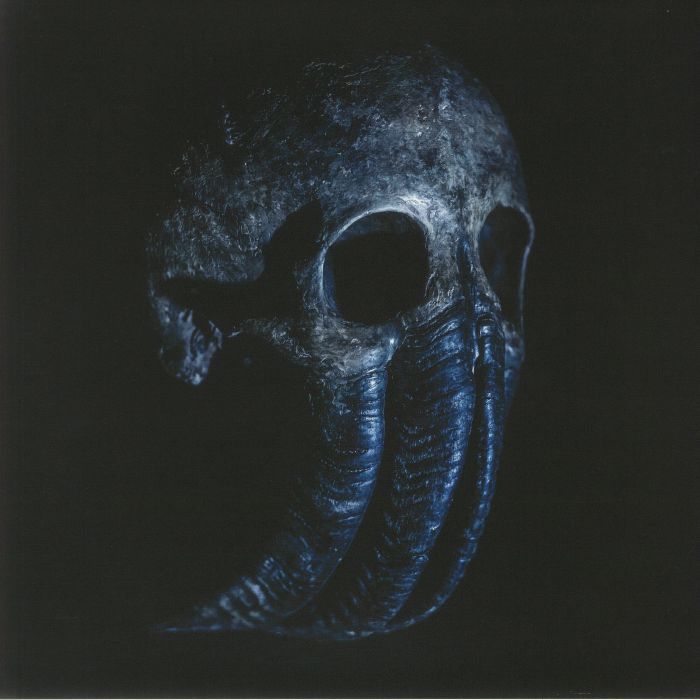
Absent In Body – Plague God (Relapse)
Few metal projects this year will evade classification in the same way Absent In Body manages on their debut, ‘Plague God’.
A hive mind collaboration between Iggor Cavalera (ex-Sepultura, Cavalera Conspiracy), Scott Kelly of Neurosis, as well as Amenra members Mathieu Vandekerckhove and Colin H. Van Eeckhout; this crushing collection of material couldn’t be more meticulous in its caustic crafting of sonic spectacle.
Eschewing traditional song structure and tropes, the industrial clang of opening track, ‘Rise From Ruins’, announces itself with hushed, concrete ambience before giving way to doom-sludge pendulums of riffs and utterly harrowing vocals delivered with such unhinged vulnerability.
The post-metal weaving of ‘In Spirit In Spite’ allows for essential breathing room with its transcendent layers, but when the two warring sonic factions strike a balance, such is the case on initial single, ‘The Acres/The Ache’, the unbridled greatness Absent In Body are beyond capable of is cast into the minor source of light.
Bridging unseen gaps between doom, drone, industrial, sludge, and post-metal while pushing the envelope of emotive delivery and performance within the larger metal scene, ‘Plague God’ proves a profound moment of change, with seasoned artists in their fields coming together to create something far more cerebral or vicious than any past work.
While perhaps too challenging for the average day ticketer, Absent In Body exude the potential and sheer vision to drag unsuspecting fans further into depths they’d personally never considered.
ZB

Vladislav Delay – Anima (Keplar)
With hindsight Anima feels like a modest and approachable notch in Sasu Ripatti’s considerable discography. That’s especially pertinent when thinking about the harsh abrasions of recent albums like Rakka, but experimentation has always driven the Finnish artist forward. Even his early Vladislav Delay works on Chain Reaction were a kind of systems music, albeit rendered into groundbreaking dub techno forms.
Anima certainly feels like a systems-oriented approach as well – more of a sculpted environment which is prepared and then unfurled over the course of an hour. Detractors found it to be pointlessly labouring one idea over three slabs of wax when it was first released in 2001, but dedicated, repeat trips into this voluminous ecosystem reveal much more. The music does indeed hinge around one synth chord which undulates fairly reliably throughout, although its sonic shape blurs and ducks, only to reappear as though a cycle is repeating. But many different things happen in and around that chord, from starkly designed, staggered rhythmic pockmarks to snatched speech pointing to some elusive narrative. Given its cyclical nature, it’s an album which creeps up on you, best experienced filling your space and waiting for opportune moments to ensnare your focus.
If someone was expecting an album of Vladislav Delay ‘tunes’ they might well be frustrated with Anima, but this is a monumental hour-long work bristling with detail, and rendered with a level of production finesse we now take for granted from Ripatti, but was leading the charge more than 20 years ago.
OW
This week’s reviewers: Neil Mason, Oli Warwick, Jude Iago James, Zach Buggy